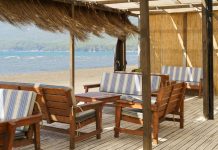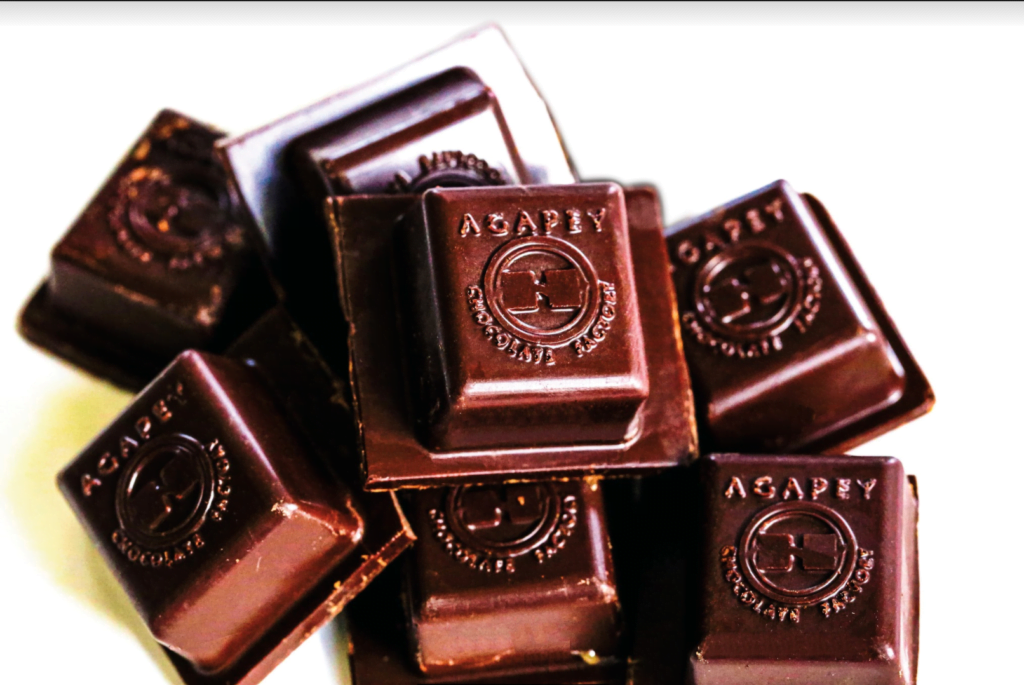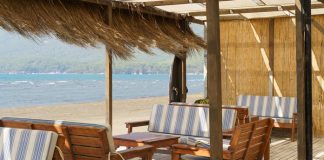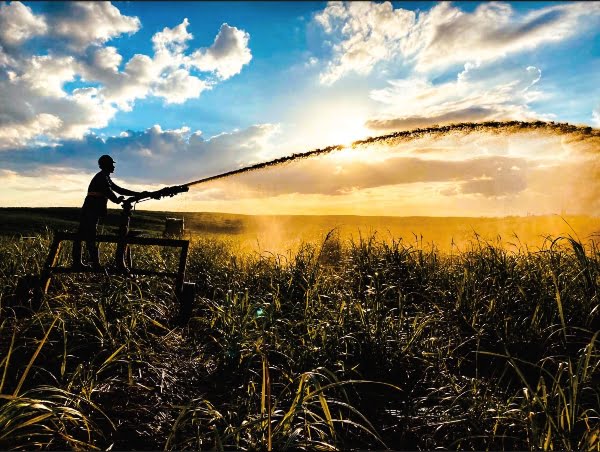
Take a trip to any local supermarket and you’re likely to encounter a little piece of the Caribbean. The grocery aisle is filled with products from the islands’ fertile soil. A new generation of Caribbean agribusinesses is seeking to transform the historically turbulent relationship between the Caribbean’s lands and its people, adopting ethical fair trade and eco-friendly practices. Meet the businesses that are modernizing heritage crops in a way that honors the past and and preserves the land for future generations.
Agapey Chocolate Factory, Barbados
Despite the region’s rich history of cocoa cultivation, the typical chocolate bar in the Caribbean is most likely imported. Bringing homegrown chocolate back to the Caribbean is 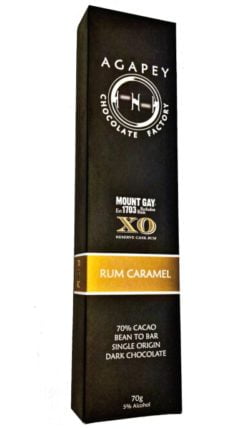 the dream behind Agapey Chocolate Factory—the brainchild of husband-and-wife founders Derrick Hastick and Jidan Kong. Based in Bridgetown, Barbados, the chocolatiers aim “to develop a strong international presence in the premium artisan market,” says Hastick.
the dream behind Agapey Chocolate Factory—the brainchild of husband-and-wife founders Derrick Hastick and Jidan Kong. Based in Bridgetown, Barbados, the chocolatiers aim “to develop a strong international presence in the premium artisan market,” says Hastick.
Using regionally grown criollo, nacional and trinitario varieties, “we source directly from cocoa associations where the government ensures fair trade for their farmers,” explains Kong. They combine these beans with locally grown Barbadian Plantation Reserve gold cane sugar. The company also collaborated with local Mount Gay Rum for their popular rum-infused line. “Our ingredients are wholesome and pure. No chemicals, not even soy lecithin,” notes Kong. “Being in the hub of the Caribbean, we are able to source some of the best cocoa beans in the world.”
Even their manufacturing process honors the ingredients, using traditional machines to preserve more authentic flavor. “We also offer limited interactive educational tours with lots of tastings at a low cost for all to enjoy” says Kong.
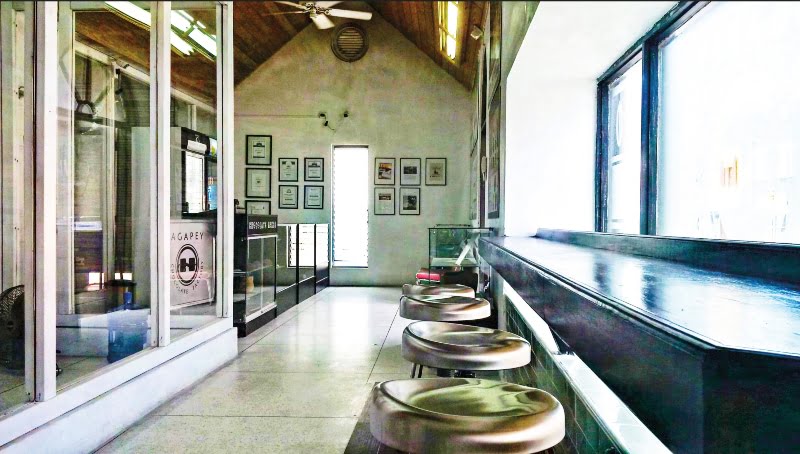
The brand mainly distributes in Barbados, but also sells online through premium third-party vendors for the U.S. market. In addition, they are focused on expanding their product lines, including goodies like their new dairy-free ice cream. “We’ll be pushing hard to find other international customers,” says Hastick.
Spirit of the Dominican Republic: Ron Barceló

Rum stands above all as the Caribbean’s libation of choice, but producing the spirit comes at a major environmental cost. Now, prestige brand Ron Barceló from the Dominican Republic is leading the industry’s environmental evolution. It’s the first rum producer in the world to achieve 100 percent carbon neutral status, certified by SGS, a global inspection company tracking greenhouse gas emissions. As the second largest exporter of dark rum in the world, “we wanted to show it’s possible to do fine rum while caring about our environment in the more than 80 markets [where] we’re present,” says brand ambassador Otto Flores.
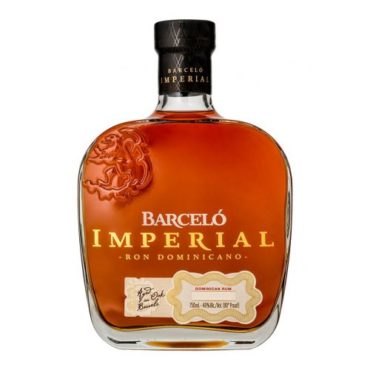 The key to their success lies in “managing greenhouse gas emissions from the production process,” explains Flores. “Distillation is the main contributor to a rum’s carbon footprint, accounting for more than a third of its emissions, largely because in addition to the energy required to power the process, distillation also creates a lot of waste in many forms.”
The key to their success lies in “managing greenhouse gas emissions from the production process,” explains Flores. “Distillation is the main contributor to a rum’s carbon footprint, accounting for more than a third of its emissions, largely because in addition to the energy required to power the process, distillation also creates a lot of waste in many forms.”
The company approaches this challenge by recycling waste, treating and reusing water, employing residue cane pulp as fuel, and applying vinasse (an organic byproduct) as fertilizer. They also sell the carbon dioxide emitted in their fermentation process, to soda companies. To offset unavoidable carbon dioxide emissions, the company also acquired emission reduction certificates to financially support green projects like reforestation.
A Wake Up Call: Caribbrew, Haiti
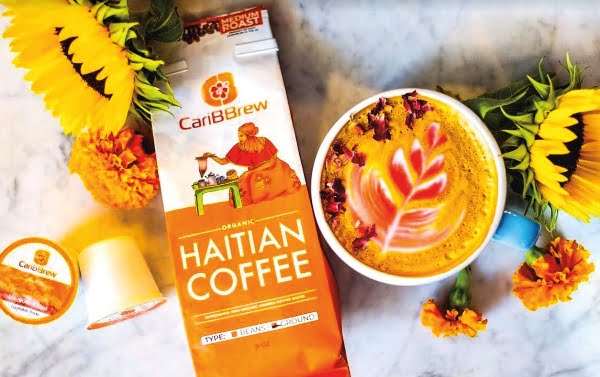
Fellowship and commerce run deep at Caribbrew, the organic Haitian coffee brand founded by Beverly Malbranche. She started the company as a way to connect to her Haitian culture when she moved to the U.S. Since then it has evolved into a unique business committed to empowering communities. “I wanted to find a product that consumers want and could help my home country,” says Malbranche about the company based in Newark, New Jersey.
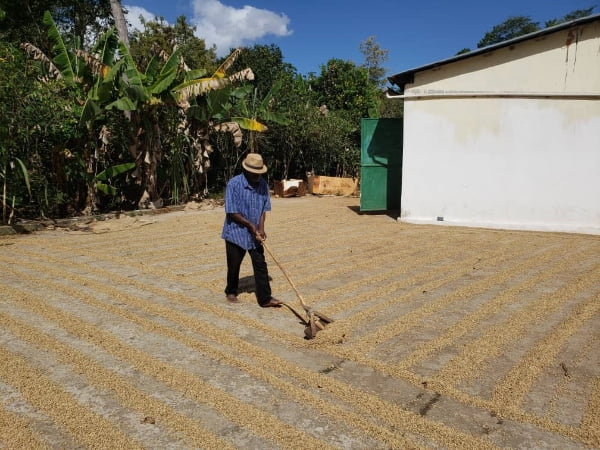
The brand works closely with a cooperative of family-owned farms in Thiotte, Haiti—a small commune known for their agricultural bounty. There, “the high mountains provide good space for Arabica coffee beans,” notes Malbranche. In addition to securing fair trade rates for these farmers, the company also provides technical assistance and a revolving no-interest loan fund to boost and streamline their production for the future. “Increasing efficiency is key to make Haitian coffee a competitor on a global scale,” she explains.
Caribbrew has also made it a priority to engage the next generation, employing younger members of the community to manage packaging and shipment. “We’re very proud of the young folks we work with, as even when Haiti was locked down for three months due to daily protests, they found a way to get the product to us.” says Malbranche. “They are the people we need to move the country forward.”


